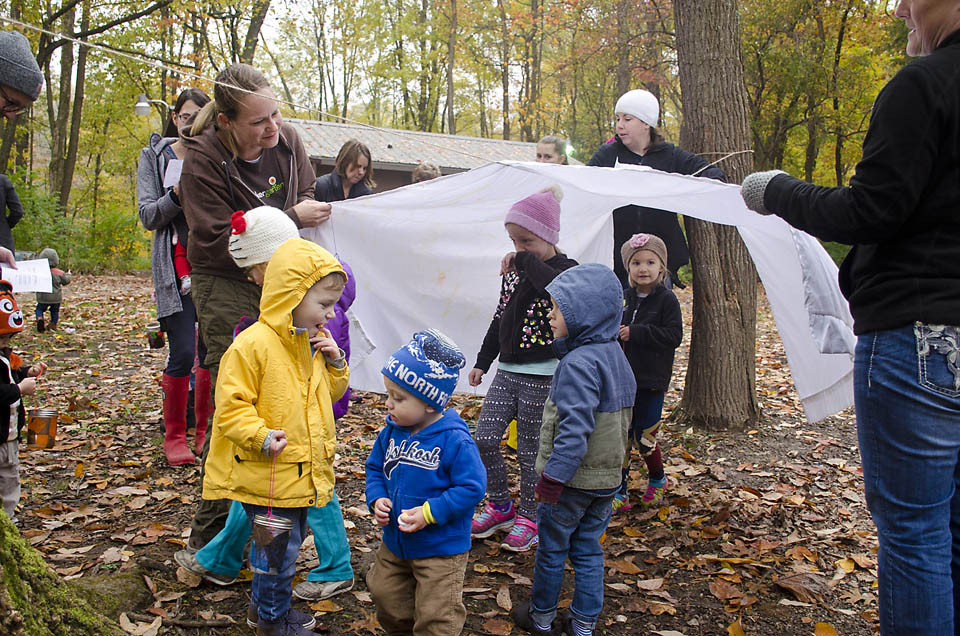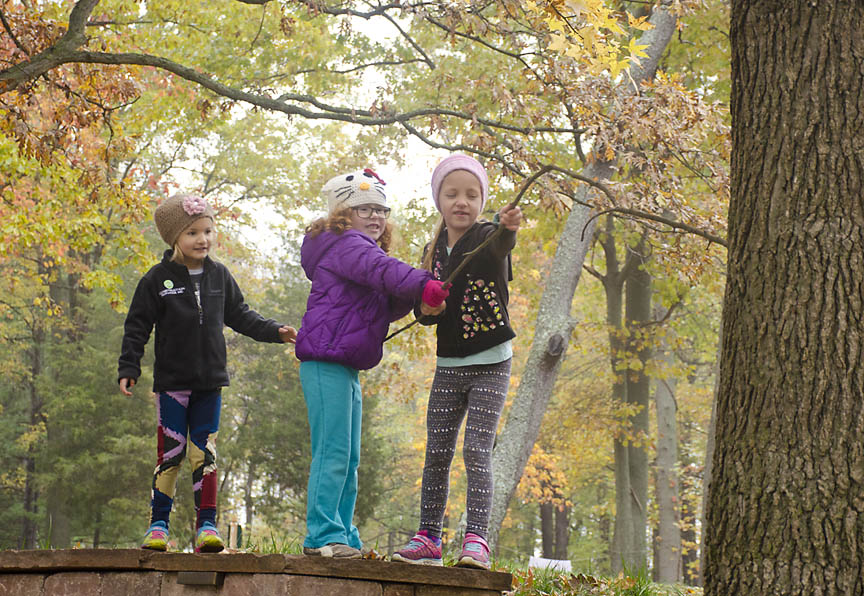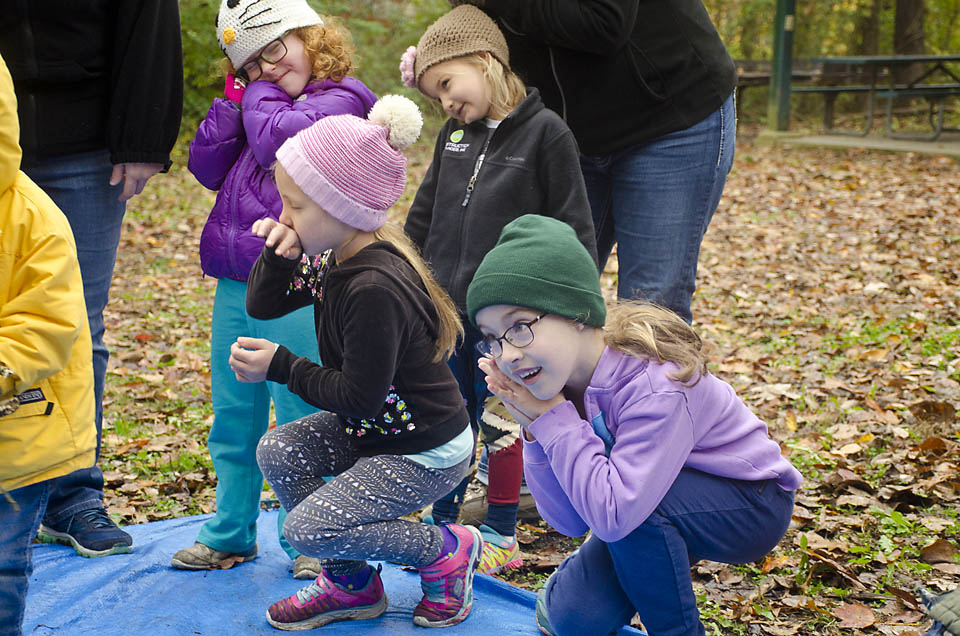It’s a chilly November morning in Terre Haute, Ind., and few people are out on foot in the light drizzle. But on the city’s east side, scenic Hawthorn Park is buzzing with activity. Here, half a dozen children and their moms are standing together singing the “Come to Tinkergarten,” a familiar tune that signals that their weekly class is about to begin. “We like to get outside a lot, but it’s nice to have another reason to get out when the weather gets yucky,” says Claire Plowgian, one of the moms, about the Tinkergarten class.
I first heard about Tinkergarten a couple of years ago and was instantly fascinated by the concept. The Massachusetts-based company trains leaders to hold outdoor classes in natural places in their communities, such as public parks, on a regular basis. The classes offer opportunities for children from 18 months to 8 years old to learn outdoors, both through free play and pre-planned activities. Besides connecting children with nature, the overarching goal of the program is to help kids develop a number of important skills, such as empathy, collaboration, creativity, resilience and problem solving.
 Tinkergarten leader Marissa Northam does a “lantern walk” with her class.
Tinkergarten leader Marissa Northam does a “lantern walk” with her class.
Truthfully, I was a bit skeptical at first. I wondered if the classes would be yet another adult-led, structured “enrichment activity” that parents enrolled their kids in just to check outdoor play off the list. And why pay for classes where children do something as elementary as playing outdoors?
Going on a bear hunt
Fast-forward to last month and I’m watching seasoned Tinkergarten leader Marissa Northam enthusiastically lead a group of about a dozen kids through a lantern walk, an imaginary bear hunt and some games at Hawthorn Park. Just like in Scandinavia’s forest schools, the activities are more invitations to play than anything, and when a couple of the younger kids trail off nobody pressures them to rejoin the group. Once Marissa opens up for free play, a group of three girls immediately grab some sticks and start “fishing” among the leaves, while some of the younger kids take turns rolling down a grassy knoll. Meanwhile, Marissa and the parents stand back, observe and chat, intervening in the children’s play as little as possible.
 At Tinkergarten a sheet becomes a tunnel for the children to play in.
At Tinkergarten a sheet becomes a tunnel for the children to play in.
“Our mission is to make sure kids get an opportunity to explore outdoors and see nature in a different way than they would at a playground,” Marissa explains. “It’s also a gentle way of teaching parents how to get outside with their kids, even in the winter.”
Creating opportunities for outdoor play
A few decades ago, classes that encourage children to play and explore outside probably would’ve been redundant. Today is a different story. Since its inception in 2012, Tinkergarten has grown rapidly to meet demand and now has over 900 leaders offering classes in 45 states and reaching a total of over 80,000 children. It’s a sign of the times that unstructured outdoor play experiences are so scarce for some kids in today’s society that adults – or in this case, Tinkergarten – have to make a conscious effort to create them. And for some children, playing and using their imaginations outdoors takes some getting used to.
 Three girls pretend to have found a bear in a tree.
Three girls pretend to have found a bear in a tree.
“I can see a big difference in the kids now compared with the first class,” says Marissa. When we opened up for free play in the beginning they were shy and didn’t know what to do. Today they’re working together and have fun playing.”
Even though each Tinkergarten session is only an hour and fifteen minutes long, the activities seem to inspire families in profound ways outside of class as well.
“I see it as planting seeds. We don’t always see the results here, but then parents will tell me months afterwards that their child is outside more, or is wanting to do things at home that they did in class, like feeding the squirrels.” says Marissa. “Some kids don’t have other kids in their neighborhood, so this becomes a community for them.”
Mommy-daughter activity
Jennifer Schwab, a mom in Marissa’s class, says that both she and her 5-year-old daughter Emerson are enjoying their weekly outing with Tinkergarten. “It’s a nice mommy-daughter date activity for us,” she says.
 Kids singing and playing at their Tinkergarten class in Indiana.
Kids singing and playing at their Tinkergarten class in Indiana.
Recently, Tinkergarten raised $5.4 million in investment capital to expand the business and defray the cost of the classes for low-income families. That means that Tinkergarten needs new leaders to join the team. More than half of the leaders are former educators, and although teaching experience is not a requirement, having previous experience from working with children is definitely a plus. Those who are selected go through an online training program and become part of the Tinkergarten community. Once the leaders are ready to start a class they can set their own schedule and make $300-$1,000 per 8-week session, depending on their location.
“We’re looking for candidates who are passionate about connecting children with nature and demonstrate strong skills engaging and supporting play for children and adults,” says Meghan Fitzgerald, Tinkergarten’s co-founder.
Back at Hawthorn Park, Marissa and her group of kids close the session by singing the “Goodbye Song,” a treasured weekly routine. “I put a lot of free time into this, but I do it because I really believe in the mission,” Marissa says before packing up her class materials and heading home.
Psst. If you’re interested in becoming a Tinkergarten leader, you can apply here.
Psst 2. I did not receive any compensation from Tinkergarten for writing this post. I just believe in their mission and think that they can be one of many solutions to the lack of outdoor play for kids today.


Hello. I just applied to be a leader. I received an email saying I will have a video interview. I’m very nervous about it. Am I speaking to someone live? Is there any way to prepare for the questions asked? Also I know Tinkergarten has gained in popularity recently. How difficult is it to obtain a leader position? Has it become very competitive? Appreciate the help. Thank you
Hello Heidi!
I don’t think you need to stress about this – just be yourself and you’ll be fine:) I’m not sure how hard it is to get accepted but I know they’ve needed a lot of leaders before, so my guess is that you should have a good chance. Good luck!